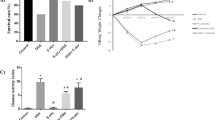Abstract
Background
The ability of intestinal helminths to manipulate the immune system of their host towards a Th2 response has been proposed to modulate auto-immune and allergic diseases.
Aims
This initial study investigated the anti-inflammatory potential of S. mansoni and soluble egg antigen (SEA) in a murine model of colitis.
Methods
Colitis was induced in female NMRI mice by 5% dextran sulfate sodium (DSS) for 7 days, either 9 weeks post-infection with S. mansoni or during treatment with SEA. In addition to clinical signs of colitis, colon histology, immunohistochemistry, and flow cytometry of leukocytes were performed. Colon cytokines were measured using a quantitative real-time technique.
Results
Infection with cercariae of S. mansoni attenuated DSS-induced colitis. Clinical symptoms such as weight loss and shortening of colon length were significantly prevented. Histological scores and cell infiltration were affected and expression of pro-inflammatory cytokines in the colons of infected DSS colitis mice was reduced. In contrast, application of SEA failed to improve colitis, even though some findings like earlier manifestation of inflammation and local induction of Th2 cytokines were similar to the effects of cercarial infection.
Conclusions
The results presented here suggest that SEA treatment could not protect mice from acute colitis. However, both infection with S. mansoni and injection of SEA affect mucosal immune responses.




Similar content being viewed by others
References
Sood A, Midha V. Epidemiology of inflammatory bowel disease in Asia. Indian J Gastroenterol. 2007;26:285–289.
Strachan DP. Hay fever, hygiene, and household size. BMJ. 1989;299:1259–1260.
Kitagaki K, Businga TR, Racila D, et al. Intestinal helminths protect in a murine model of asthma. J Immunol. 2006;177:1628–1635.
Weinstock JV, Summers R, Elliott DE. Helminths and harmony. Gut. 2004;53:7–9.
Araújo MI, Hoppe BS, Medeiros M, et al. Schistosoma mansoni infection modulates the immune response against allergic and auto-immune disease. Mem Inst Oswaldo Cruz. 2004;99:27–32.
Setiawan T, Metwali A, Blum AM, et al. Heligmosomoides polygyrus promotes regulatory T-cell cytokine production in the murine distal intestine. Infect Immun. 2007;75:4655–4663.
Hunter MM, Wang A, Hirota CL, et al. Neutralizing anti-IL-10 antibody blocks the protective effect of tapeworm infection in am murine model of chemically induced colitis. J Immunol. 2005;174:7368–7375.
Khan WI, Blennerhasset PA, Varghese AK, et al. Intestinal nematode infection ameliorates experimental colitis in mice. Infect Immun. 2002;70:5931–5937.
Moreels TG, Nieuwendijk RJ, De Man JG, et al. Concurrent infection with Schistosoma mansoni attenuates inflammation induced changes in colonic morphology, cytokine levels, and smooth muscle contractility of trinitrobenzene sulphonic acid induced colitis in rats. Gut. 2004;53:99–107.
Elliott DE, Li J, Blum A, et al. Exposure to schistosome eggs protects mice from TNBS-induced colitis. Am J Physiol Gastrointest Liver Physiol. 2003;284:385–391.
Mo HM, Liu WQ, Lei JH, et al. Schistosoma japonicum eggs modulate the activity of CD4 + CD25 + Tregs and prevent development of colitis in mice. Exp Parasitol. 2007;116:385–389.
Summers RW, Elliott DE, Qadir K, et al. Trichuris suis seems to be safe and possible effective in the treatment of inflammatory bowel disease. Am J Gastroenterol. 2003;98:2034–2041.
Summers RW, Elliott DE, Urban JF, et al. Trichuris suis therapy for active ulcerative colitis: a randomized controlled trial. Gastroenterology. 2005;128:825–832.
Summers RW, Elliott DE, Urban JF, et al. Trichuris suis therapy in Crohn′s disease. Gut. 2005;54:87–90.
Kradin RL, Badizadegan K, Auluck P, et al. Iatrogenic Trichuris suis infection in a patient with Crohn disease. Arch Pathol Lab Med. 2006;130:718–720.
Smith P, Mangan NE, Walsh CM, et al. Infection with a helminth parasite prevents experimental colitis via a macrophage-mediated mechanism. J Immunol. 2007;178:4557–4566.
Okayasu I, Hatakeyama S, Yamada M, et al. A novel method in the induction of reliable experimental acute and chronic ulcerative colitis in mice. Gastroenterology. 1990;98:694–702.
Kawada M, Arihiro A, Mizoguchi E. Insights from advances in research of chemically induced experimental models of human inflammatory bowel disease. World J Gastroenteol. 2007;13:5581–5593.
Melgar S, Karlsson L, Rehnström E, et al. Validation of murine dextran sulfate sodium-induced colitis using four therapeutic agents for human inflammatory bowel disease. Int Immunopharmacol. 2008;8:836–844.
Wirtz S, Neufert C, Weigmann B, et al. Chemically induced mouse models of intestinal inflammation. Nat Protoc. 2007;2:541–546.
Cruickshank SM, English NR, Felsburg PJ, et al. Characterization of colonic dendritic cells in normal and colitic mice. World J Gastroenterol. 2005;11:6338–6347.
Maul J, Loddenkemper C, Mundt P, et al. Peripheral and intestinal regulatory CD4 + CD25 (high) T-cells in inflammatory bowel diseases. Gastroenterology. 2005;128:1868–1878.
Pearce EJ, Kane CM, Sun J, et al. Th2 response polarization during infection with the helminth parasite Schistosoma mansoni. Immunol Rev. 2004;201:117–126.
Ashton PD, Harrop R, Shah B, et al. The schistosome egg development and secretions. Parasitology. 2001;122:329–338.
Ruyssers NE, De Winter BY, De Man JG, et al. Therapeutic potential of helminth soluble proteins in TNBS-induced colitis in mice. Inflamm Bowel Dis. 2009;15:491–500.
Author information
Authors and Affiliations
Corresponding author
Additional information
Peggy Bodammer and Grit Waitz contributed equally to this work.
Rights and permissions
About this article
Cite this article
Bodammer, P., Waitz, G., Loebermann, M. et al. Schistosoma mansoni Infection but Not Egg Antigen Promotes Recovery from Colitis in Outbred NMRI Mice. Dig Dis Sci 56, 70–78 (2011). https://doi.org/10.1007/s10620-010-1237-y
Received:
Accepted:
Published:
Issue Date:
DOI: https://doi.org/10.1007/s10620-010-1237-y




